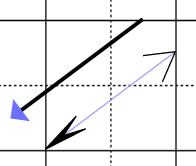| ASP.NET Ajax Javascript (Specification) | |
|---|---|
function get_lineColor() : String function set_lineColor(value : String) | |
| ASP.NET Ajax Javascript (Usage) | |
|---|---|
var resultVar = instanceOfMark.get_lineColor(); | |

| ASP.NET Ajax Javascript (Specification) | |
|---|---|
function get_lineColor() : String function set_lineColor(value : String) | |
| ASP.NET Ajax Javascript (Usage) | |
|---|---|
var resultVar = instanceOfMark.get_lineColor(); | |
This JavaScript code will create the mark shown in the image on this page.
// Create a new line mark.
var mark = new ImageGear.Web.UI.Mark(ImageGear.Web.UI.MarkType.Line);
// Set various properties.
var points = mark.get_points();
points.setPoint(0, new ImageGear.Web.UI.Point(75, 175));
points.setPoint(1, new ImageGear.Web.UI.Point(175, 100));
mark.set_headFillColor('#7070ff');
mark.set_startHeadAngle(45);
mark.set_startHeadLength(10);
mark.set_startHeadType(ImageGear.Web.UI.LineHeadType.Solid);
mark.set_lineWidth(3);
// Add the mark to the page.
// Adding them after setting the properties avoids a lot of needless markChanged events.
$find('PageView1').get_artPage().addMark(mark);
// Create a new line mark.
// Note that if you skip this step, you will overwrite the properties of the original mark and the second call to addMark() will do nothing because the mark is already associated with the ArtPage.
mark = new ImageGear.Web.UI.Mark(ImageGear.Web.UI.MarkType.Line);
// Set various properties.
points = mark.get_points();
points.setPoint(0, new ImageGear.Web.UI.Point(100, 200));
points.setPoint(1, new ImageGear.Web.UI.Point(200, 125));
mark.set_lineColor('#a0a0ff');
mark.set_endHeadAngle(30);
mark.set_endHeadLength(25);
mark.set_endHeadType(ImageGear.Web.UI.LineHeadType.Pointer);
mark.set_startHeadAngle(10);
mark.set_startHeadLength(35);
mark.set_startHeadType(ImageGear.Web.UI.LineHeadType.PointerSolid);
// Add the mark to the page.
// Adding them after setting the properties avoids a lot of needless markChanged events.
$find('PageView1').get_artPage().addMark(mark);
This property specifies the color to use for lines and borders of marks. If you change the value of this property, this object will raise its propertyChanged event.
This figure shows two lines; the left one has a line color of black and the right one has a line color of lavender.

Mark types: This property is valid for all mark types.
Valid values: A 7-character string representing a color. The first letter must be a "#" symbol and the other six characters must be hexadecimal digits representing the red, green, and blue portions of the color. This is identical to one of the common ways to specify colors in HTML.
Default value: '#000000'
ImageGear for .NET name: Color (for Line and Polyline marks) and Border.Color (for Rectangle, Ellipse, Polygon, and Text marks).
NotateXpress (version 10) name: PenColor